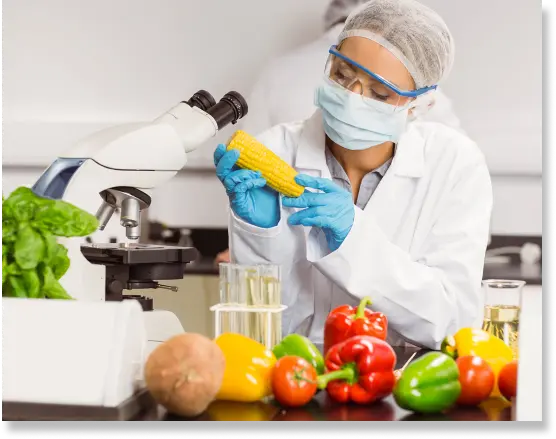Case Study | 25 July 2025
How a Leading Italy-Based Food Safety Testing Company Leveraged Innovation to Dominate the Market by 2034?
Posted by : Dhruv Bhatia
In an age of speedy emerging customer awareness and increasing food safety administrations, a top-tier Italy-based food safety testing firm was striving to extend its dominance in the market and modernize the overall operation. Coming across rigid competition and transitory sector trends, the firm sought to Research Nester to recognize barriers in its initiatives and implement progressive developments. Through benchmarking and competitive analysis, Research Nester exposed severe market strategies and enabled the firm to rearrange its evaluative methods, incorporate AI-powered technologies, and extend its service offerings. By the end of 2034, the firm will increase its market share by 30% and also improve its product demand by 40%, thereby achieving a suitable position as one of the sector’s leaders.

An overview:
- The Italy-based food safety firm, which is a long-lasting leader in the sector, has developed a robust status through its deep-rooted consumer relationship and extensive laboratory services.
- By 2023, the firm directed a 60% market share in Italy and had its presence across the whole of Europe. Despite this dominant position, the leadership identified that evolving technical innovations and a sudden shift in administrative needs revealed its poor competitive edge.
- With the ultimate objective of strengthening its market share to 85% by the end of 2034, the firm required a tactical reorganization to modernize its overall operation and evolve with current industry standard policies.
- A severe gap in development was the firm’s dependency on ancient testing methods, which lagged behind competitors implementing hasty pathogen detection systems, blockchain-based tracing devices, and AI-powered diagnostics.
- Physical processes resulted in a long turnaround duration, which put the company in a false position since rival organizations successfully delivered outcomes within a day by utilizing an automated platform.
- An increase in the latest food safety concerns, including nano-toxic, cross-contamination, and CRISPR-based foods, indicated that the firm’s current service portfolio was not at all suitable to cater to market requirements.
- Identifying these risks, the firm engaged with Research Nester to provide a wide-ranging competitive analysis and benchmarking evaluation.
- The consultation revealed that almost 65% of leading rivals already utilize predictive AI analysis to notice contamination-based challenges before reaching out to customers, while 80% already implemented blockchain for actual transparency in the supply chain.
- Emerging administrative policies under the 2021 EU Food Safety Act have mandated stringent thresholds for microbial contaminants and pesticide residues, thus demanding rapid and precise testing strategies.
- With the absence of immediate modernization, the firm led to losing almost 32% of its market share in five years.
- Therefore, Research Nester’s verdict was a wake-up call that highlighted the immediate demand for AI implementation, which extended testing capabilities and upskilled the workforce to ensure rapid leadership position for the emerging food safety landscape.


The Story
By early 2022, the Italy-based food safety testing firm provoked a speedy shift in the industry’s landscape that revealed severe vulnerabilities in the overall operation. The most persistent challenge was its dependency on ancient evaluation methodologies. While rival companies readily embraced AI-powered mass spectrometry as well as blockchain-driven traceability systems, the client firm continued to be resilient on physical and labor-based processes. This technological barrier enhanced human errors, and also made it challenging to keep up with the pace of the latest food adulterants and contaminants that are entering international supply chain dynamics.
The second major risk pertained to the turnaround duration. While leaders in the sector effectively incorporated high-throughput robot-based testing devices, along with machine learning-driven analytics to successfully deliver outcomes within a day, the firm’s conventional laboratory technologies needed 2 to 3 days. This deliberately led to a significant disadvantage in a period where food retailers and manufacturers require near-instantaneous safety certifications. In addition, this inefficiency caused frustration among long-term clients, the majority of whom commenced with transitioning contracts to agile rival companies.
Moreover, the firm’s limited-service portfolio also worsened the overall competitive fight. The market has been rapidly integrating dedicated nanoparticle toxicity, laboratory-based proteins, and plant-based meats, and meanwhile, the firm’s offerings were focused on traditional food divisions. This barrier made the client firm unable to capitalize on the USD 12.5 billion alternative protein testing market, which was increasing at 17% yearly. Likewise, the absence of allergen cross-contact detection devices for nuts, gluten, and other high-risk ingredients made the firm inappropriate for food brands experiencing tightened EU labeling legal aspects.
Furthermore, the most immediate challenge that originated from administrative pressure was the 2031 EU Food Safety Act that unveiled stringent thresholds for microbial contaminants, pesticide residues, heavy metals, along with compulsory blockchain-powered batch tracking for almost all imported foods. Besides, non-compliant laboratories risked the absence of accreditation, and despite this, the client firm’s systems were poorly equipped to cater to these latest demands. In this regard, Research Nester’s market analysis revealed the stakes, including the international food safety testing industry, which was valued at USD 33.5 billion in 2022, and projected to increase to USD 55.7 billion with an 8.8% growth rate by the end of 2034. However, organizations sticking to legal systems experienced 32% erosion in the market share in five years, denoting a destiny that the Italy-based firm can only avoid through transformative and immediate advancement.
Our Solution:
Research Nester incorporated a three-phase strategy to rearrange the firm’s operations:
- The consulting firm analyzed at least 15 notable rival organizations across North America and Europe, and evaluated consumer satisfaction metrics, turnaround efficiency, diversification in services, and technical integration. These findings denoted that 65% of top rivals were utilizing machine learning for prognostic contamination analysis, while 80% incorporated blockchain technology for ensuring transparency in the supply chain.
- Based on the benchmarking outcomes, Research Nester suggested AI-driven rapid evaluation by adopting spectroscopy automation to diminish testing duration from 3 days to within 6 hours. Additionally, GMO and strengthened allergen testing by adding 15 latest parameters, such as CRISPR-based food safety assessments.
- To support expertise and staff enhancement, the firm employed 45 newest food scientists with specialization in AI and bioinformatics, enhanced the skills of 125 employees in blockchain-driven tracing systems, and collaborated with technological organizations to jointly develop robotic pathogen identification kits.


Results
By integrating Research Nester’s tactical suggestions, the Italy-based firm gained the following:
- A surge in market share, increasing from 57% as of 2022 to 85% by the end of 2034.
- An increase in revenue growth through extended testing services by USD 225 million within 24 months.
- Diminished report delivery timeline by 90%, thereby attracting more than 40 newest corporate clients.
- Improved brand status by identifying the firm as one of Europe’s most advanced food safety laboratories by 2033.
- The aspect of gaining international expansion by entering Latin America and Asia-Pacific, and enhancing global revenue by 42%.
customized message
Dhruv Bhatia is an accomplished Senior Research Analyst at Research Nester Analytics LLC, with over five years of industry experience, including nearly four years in his current role. He brings specialized expertise in the Consumer Goods & Food sector—including packaged and functional foods, beverages, personal and home care products, and e-commerce dynamics—as well as in Agriculture & Allied Activities, spanning crop protection, agri-biotech, sustainable farming, dairy, and aquaculture technologies.
Dhruv leads end-to-end consulting and custom research engagements, overseeing project scoping, cross-functional team coordination, data validation, and strategic delivery. His strong command over market sizing methodologies, trend analysis, and industry forecasting ensures the development of high-quality, insight-rich reports that support client decision-making and market strategy.
A key pillar of internal capability development, Dhruv is actively involved in training junior analysts, conducting knowledge sessions on research frameworks, data interpretation, and structured report writing. He is equally instrumental in business development, contributing to proposal writing, pre-sales documentation, and managing post-delivery client interactions to foster long-term partnerships and satisfaction.
Thank you for contacting us!
We have received your request for proposal. Our research representative will contact you shortly.
Copyright @ 2026 Research Nester. All Rights Reserved.


